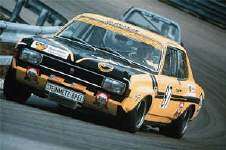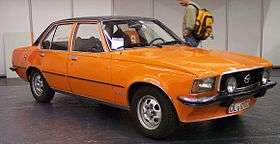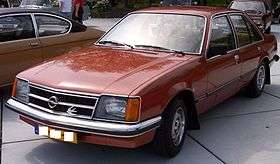Opel Commodore
| Opel Commodore | |
|---|---|
 Opel Commodore A Coupé | |
| Overview | |
| Manufacturer | Opel (General Motors) |
| Production | 1967–1982 |
| Body and chassis | |
| Class | Executive car |
| Platform | V body |
| Chronology | |
| Successor | Opel Omega |
The Opel Commodore is an executive car produced by Opel from 1967 to 1982. It is the six-cylinder variant of the Rekord with styling differences. The Commodore nameplate was used by Opel from 1967 to 1982. However, its nameplate/lineage continues with the Australian Holden Commodore. The last generation was sold in the United Kingdom primarily as the Vauxhall Viceroy although Opel models were also sold.
Commodore A (1967–1971)
| Commodore A | |
|---|---|
|
1970 Opel Commodore A Coupé | |
| Overview | |
| Production | 1967–1971 |
| Body and chassis | |
| Body style |
2-door sedan 4-door sedan 2-door coupé |
| Related |
Opel Rekord C Chevrolet Opala |
| Powertrain | |
| Engine |
2.2 L-I6: 95 PS (70 kW; 94 hp) 2.5 L-I6: 115 PS (85 kW; 113 hp), 120 PS (88 kW; 118 hp) 130 PS (96 kW; 128 hp) 150 PS (110 kW; 148 hp) 2.8 L-I6: 145 PS (107 kW; 143 hp) |
| Transmission |
4-speed manual 2- or 3-speed-automatic |
| Dimensions | |
| Wheelbase | 2,668 mm (105.0 in) |
| Length | 4,574 mm (180.1 in) |
| Width | 1,754 mm (69.1 in) |
| Height | 1,445 mm (56.9 in) |
| Curb weight | 1,130 kg (2,491.2 lb)-1,270 kg (2,799.9 lb) |
The Opel Commodore A was manufactured from 1967 to 1971, based on the Rekord C. After having offered a Rekord-6 powered by a 2.6 L 6-cylinder engine since March 1964,[1] Opel in February 1967 launched the Commodore as a faster up-market version of the Rekord. The Commodore was initially available with the known[2] A 2.2 litre six or a larger 2.5 L engine developing 115 PS (85 kW) with a single carburettor. Body styles comprised a two-door or four-door sedan and a two-door hardtop coupé. In September 1967 the sporty Commodore GS offering 130 hp (96 kW) from a double-carburettor 2.5 L-six was introduced.
For model year 1969, the carryover 2.2 litre six was dropped and the optional 2-speed Powerglide automatic was abandoned in favor of Opel's new 3-speed automatic transmission.
From September 1969, the base 2.5 L-engine was pumped up to 120 PS (88.3 kW; 118.4 hp); at the same time, both remaining engines received hydraulic lifters for smoother running, a new exhaust system and six camshaft bearings. The handbrake lever was moved from its position under the dash to a location between the front seats and the fuel tank was enlarged from 55 to 70 litres.
An even more sporty model than the GS, the Commodore GS/E, debuted in March 1970. It had a 2.5 L engine equipped with Bosch D-jetronic fuel injection system developing 150 PS (110 kW), which gave the car a top speed of 197 km/h (123 mph). The Commodore GS/E also had a career in motorsports, with a car prepared by Steinmetz. In April 1970 a Commodore with a detuned and carburetted 2.8 L-six giving 145 PS (106.6 kW; 143.0 hp) followed (GS 2800).
156,330 Commodore As were built, including 2,574 GS and GS/E variants.
-

Opel Commodore A 2-door sedan
-

Rear view
-

Opel Commodore Coupé (1967–1971)
-

Rear view
-
Cockpit
-

Opel Commodore GS/E
-
Cockpit (GS/E)
-

Opel Commodore GS3000 Steinmetz
Commodore B (1972–1977)
| Commodore B | |
|---|---|
 | |
| Overview | |
| Production |
1972–1977 1973–1978 (South Africa) |
| Body and chassis | |
| Body style |
4-door sedan 2-door coupé |
| Related | Opel Rekord D |
| Powertrain | |
| Engine |
2.5 L-I6: 115 PS (84.6 kW; 113.4 hp), 130 PS (95.6 kW; 128.2 hp) 2.8 L-I6: 130 PS (95.6 kW; 128.2 hp) 142 PS (104.4 kW; 140.1 hp) 160 PS (117.7 kW; 157.8 hp) |
| Transmission |
4-speed manual 3-speed-automatic |
| Dimensions | |
| Wheelbase | 2,668 mm (105.0 in) |
| Length | 4,607 mm (181.4 in) |
| Width | 1,728 mm (68.0 in) |
| Height | 1,380 mm (54.3 in) – 1,415 mm (55.7 in) |
| Curb weight | 1,210 kg (2,667.6 lb)-1,305 kg (2,877.0 lb) |
The Commodore B was based on the Rekord D, and launched in 1972. As in the previous generation, four models were offered: 2500 S, 2500 GS, 2800 GS and 2800 GS/E, as a four-door saloon and two-door hardtop coupé (although the fastback design was replaced by a more conventional three-box design). Power ranged from 115 to 160 PS (84.5 to 118 kW).
The Rekord and Commodore were also assembled as CKD kits in Belgium and Switzerland in the 1970s. These cars carried the name Ranger and differed from the originals in having different grilles and trim. These cars were exported to various countries.
In 1974, due to new regulations regarding pollutant emissions, the 2.5 L base models were dropped and the 2.8 L was detuned to 129/140/155 PS (127/138/153 hp). Commodore B production ended in 1977.
The Commodore B series was like the A series briefly used in motorsports, and the extreme "Jumbo" Commodore raced in the 1974 "interserie". It used a 6,0 litre V8 engine and had large wings which almost made it unrecognizable as an Opel. It never enjoyed much success despite of its massive powerplant and impressive output.
-

Opel Commodore GS
-

Opel Commodore GS/E Coupé
Foreign assembly
Opel Commodores were also built in Iran between 1973 and 1976 under the name Chevrolet Iran or Chevrolet Royale 2800 and 2500 with both 2.5 L and 2.8 L engines by Iran General Motors Company.
It was also assembled in South Africa, where it was called the Chevrolet 3800 and 4100, and was a top seller in that market. These received inline-six engines of Chevrolet origins.
Commodore C (1977–1982)
| Commodore C | |
|---|---|
 | |
| Overview | |
| Production | 1977–1982 |
| Body and chassis | |
| Body style |
2/4-door sedan 5-door station wagon |
| Related |
Opel Rekord E Holden Commodore VB |
| Powertrain | |
| Engine |
2.5 L I6 3.0 L I6 (ZA) 3.8 L Chevrolet 230 I6 (ZA) 4.1 L Chevrolet 250 I6 (ZA) |
| Transmission |
4-speed manual 3-speed-automatic |
| Dimensions | |
| Wheelbase | 2,668 mm (105.0 in) |
| Length | 4,732 mm (186.3 in) |
| Width | 1,722 mm (67.8 in) |
| Height | 1,415 mm (55.7 in) |
| Curb weight | 1,200 kg (2,646 lb)-1,310 kg (2,888 lb) |
| Chronology | |
| Successor | Opel Omega A |
The Commodore C was introduced in late 1977, at the same time as the Rekord E. The Commodore continued to be a larger and more luxurious version of the Rekord. There was no coupé version of the Commodore C, as it was replaced by the Opel Monza, the coupé version of the Opel Senator, but a two-door sedan was briefly available. The single engine used by the Commodore in Europe was the well-known straight-six 2.5-litre unit with 115 PS (85 kW; 113 hp) or 130 PS (96 kW; 128 hp) when fitted with fuel injection.
The new model featured a similar front end to the larger Senator. It was sold in the UK under the name Vauxhall Viceroy, with the Viceroy being a slightly more luxurious version of the Carlton. It was the Opel Commodore and Vauxhall Viceroy that formed the basis for the first Holden Commodore in Australia, and was sold in South Africa as the Chevrolet Commodore until 1982, when it was rebadged as an Opel. The South African Commodore was introduced in July 1978, at the same time as the Rekord E went on sale there. These originally had Chevrolet engines, pushrod inline-sixes of 3.8 or 4.1 liters.[3]
There was an estate version (dubbed the "Voyage" in Germany) offered in the Opel range from 1979 to 1982, which became a mainstay in the Holden range in Australia, and was also available in the Chevrolet range in South Africa.
It was never offered in the UK as a Vauxhall Viceroy, although a one-off estate car was built in 1981 for Queen Elizabeth II, for her to carry her Corgi dogs. The car still survives today, one of only 15 Vauxhall Viceroys left registered in the UK, as of 2006.
The Commodore was dropped by Opel in Europe and absorbed into the Rekord range of 1983. However, in South Africa, Delta (formerly General Motors South Africa) offered a revised version of the Commodore until the early 1990s, again combining the bodyshell of the Rekord with the front end of the revised Senator, which was also sold there with the same 3-liter inline-six, producing 180 PS (132 kW).[4] The facelifted South African Commodore was only available as a sedan. A similar model, the Royale, was also produced by Daewoo in South Korea.
It is this model which the early Holden Commodore models were based on, introduced in late 1978, and eventually replaced (after several facelifts) in 1988, with a model with styling based on the then-current Senator and Omega models.
-

Opel Commodore C (1978–1982)
-

Opel Commodore C Voyage (1981–1982)
-
Opel Commodore C (1978–1982)
-
In the UK, the Opel Commodore C was also sold as the Vauxhall Viceroy
Sources
- Werner Oswald, Deutsche Autos 1945–1975. Motorbuch Verlag, Stuttgart 1975. ISBN 978-3-87943-391-9. (For Commodore A)
- ↑ Zink, Günther (2009). "Oldtimer Katalog" (in German) 23. Königswinter: HEEL Verlag GmbH: 262–263. ISBN 978-3-86852-067-5.
- ↑ The 2239 cc engine with which the Commodore was launched shared its 82.5 x 69.8 mm cylinder dimensions with the four-cylinder 1492 cc Rekord engine on which it was based. The unit was first seen in the short-lived six-cylinder version of the Opel Rekord towards the end of 1966, but ceased to be offered in the Rekord after July 1967 when it became the entry level power unit for the newly introduced Opel Commodore.
- ↑ Mastrostefano, Raffaele, ed. (1985). Quattroruote: Tutte le Auto del Mondo 1985 (in Italian). Milano: Editoriale Domus S.p.A. pp. 186–187. ISBN 88-7212-012-8.
- ↑ Lösch, Annamaria, ed. (1985). World Cars 1985. Pelham, NY: The Automobile Club of Italy/Herald Books. p. 332. ISBN 0-910714-17-7.
External links
| Wikimedia Commons has media related to Opel Commodore. |
- Opel Commodore history (in Russian) English translation here
- Opel Commodore A technical information (in Finnish)
- Opel technical specifications at Histomobile
- Classic Opel Parts database
- Opel Commodore C (in Polish and English soon)
| ||||||||||||||||||||||||||||||||||||||||||||||||||||||||
| « previous Opel car timeline, 1947–1979 next » | |||||||||||||||||||||||||||||||||
|---|---|---|---|---|---|---|---|---|---|---|---|---|---|---|---|---|---|---|---|---|---|---|---|---|---|---|---|---|---|---|---|---|---|
| Class | 1940s | 1950s | 1960s | 1970s | |||||||||||||||||||||||||||||
| 7 | 8 | 9 | 0 | 1 | 2 | 3 | 4 | 5 | 6 | 7 | 8 | 9 | 0 | 1 | 2 | 3 | 4 | 5 | 6 | 7 | 8 | 9 | 0 | 1 | 2 | 3 | 4 | 5 | 6 | 7 | 8 | 9 | |
| Small family car | Kadett A | Kadett B | Kadett C | ||||||||||||||||||||||||||||||
| Olympia | Olympia A | ||||||||||||||||||||||||||||||||
| Large family car | Olympia Rekord | Rekord P1 | Rekord P2 | Ascona A | Ascona B | ||||||||||||||||||||||||||||
| Rekord A | Rekord B | Rekord C | Rekord D | Rekord E | |||||||||||||||||||||||||||||
| Executive car | Commodore A | Commodore B | Commodore C | ||||||||||||||||||||||||||||||
| Luxury vehicle | Admiral | Kapitan | Diplomat | Senator | |||||||||||||||||||||||||||||
| Sports car | Manta A | Manta B | |||||||||||||||||||||||||||||||
| GT | |||||||||||||||||||||||||||||||||
